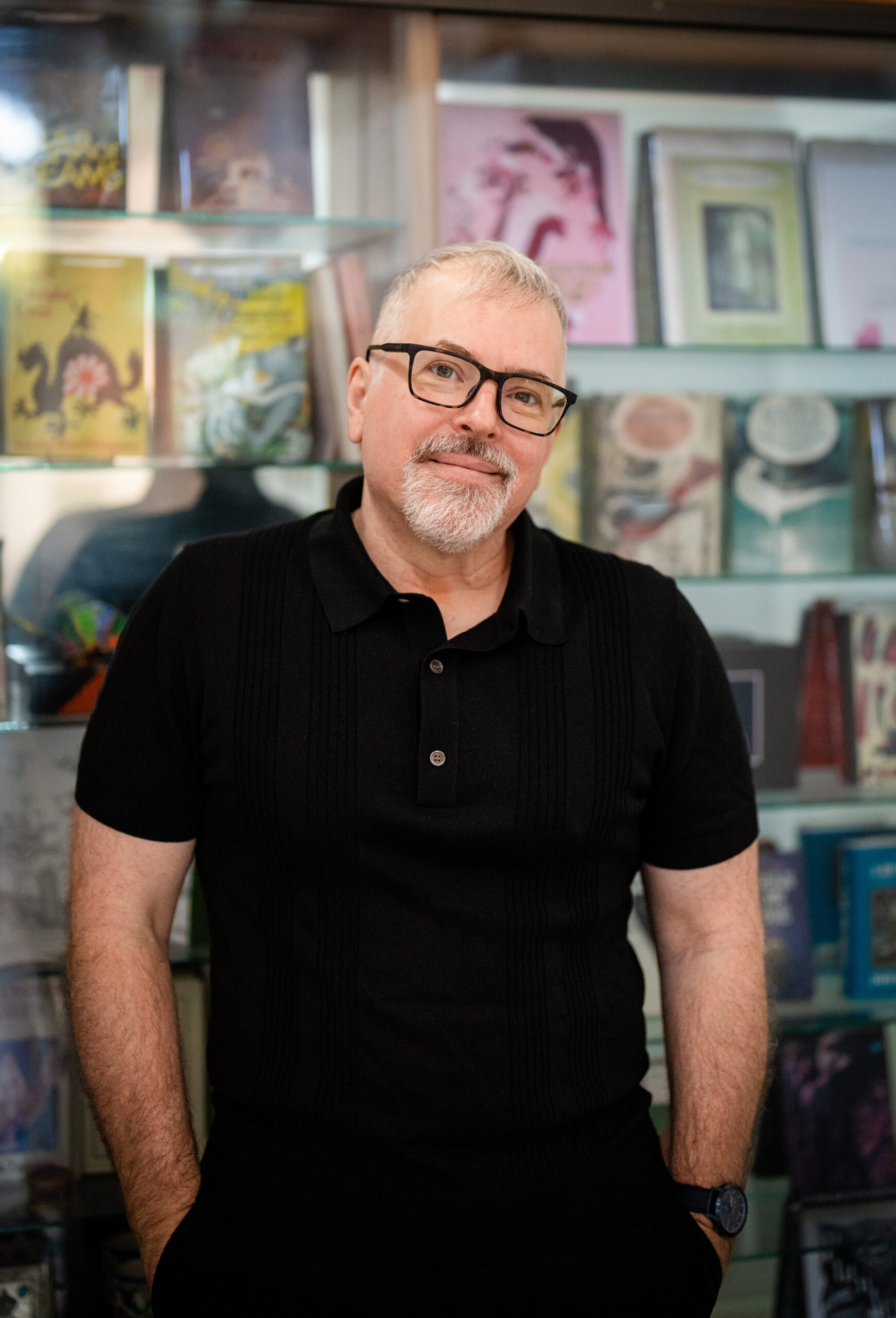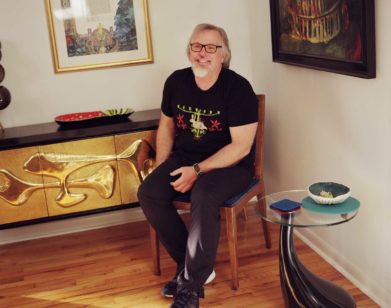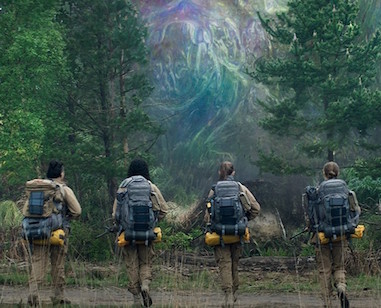IN CONVERSATION
Jeff VanderMeer Tells Victor LaValle Why He Returned to Area X

Jeff VanderMeer, photographed by Azhar Khan.
Ten years ago, Jeff VanderMeer penned the unsettling, swampy, bureaucratic hellscape of Area X: a contaminated region off of the Floridan coast that became the setting for his immensely popular Southern Reach trilogy, comprised off Annihilation, Authority, and Acceptance. The books were devoured by fans across the world and appear especially urgent now as we slide further into our own real-world dystopia of warm waters and toxic air. That VanderMeer has now published a fourth book in the series, Absolution—a follow-up that’s just as unnerving, obsessively researched, and rich in detail—serves as a strong testament to the novels’ enduring resonance. “The line is so permeable that the place where you begin to go off into imagination and the place where the real world is unimaginable seems wonderfully amorphous,” remarked fellow fantasy writer Victor LaValle when the two got on a call hours before Hurricane Milton was set to make landfall last month. In conversation, the two got to talking about their horror-fiction roots, VandeMeer’s beloved social media photo diary, and whether he’d ever consider making another return to Area X in the future.
———
VICTOR LAVALLE: Good morning.
JEFF VANDERMEER: Good morning. How are you? Good to see you.
LAVALLE: Same, same. Are you home, are you safe?
VANDERMEER: I’m safe. Luckily it’s going a little south, so we’re not even getting that much rain. We have a tree that fell gently on our carport that’s now overhanging our roof. It hasn’t caused any damage, but they can’t get rid of it for another week, so it’s like this thing just hanging over our heads that we hope doesn’t shift at all.
LAVALLE: I feel like that’s apt.
VANDERMEER: It is, right? It’s metaphorically correct. Also, Victor, I want to say congrats on the series. I love seeing the photos of you on the set and everything. It’s really awesome.
LAVALLE: Oh, thanks. I appreciate that. It’s interesting–it’s probably a conversation we can save for in-person about the joys and non-joys of the process.
VANDERMEER: Hopefully there have been slightly more joys than non-joys.
LAVALLE: For sure. Even at the moments of frustration, I have a moment where I go, “This is just fun.”
VANDERMEER: It’s amazing, right?
LAVALLE: Yeah. And I think moving into that world has reminded me of my great appreciation for the fact that in the end, I still get to go back and write a book.
VANDERMEER: Exactly. And you’re not going to be completely subsumed by Hollywood either, right?
LAVALLE: For sure.
VANDERMEER: That’s the thing, I want to remain a novelist who maybe dips my finger in every once in a while if I get the opportunity.
LAVALLE: That’s right. Anyway, I also know that we’re talking about the new book. And, maybe this will seem like a slightly cheesy sort of segue, but I was thinking of Southern Reach as a trilogy, and Absolution as seasons, as opposed to one particular tale.
VANDERMEER: That’s a really interesting way of looking at it, because even if you were to make a series out of these books, you would make radically different ones out of each book.
LAVALLE: That’s right.
VANDERMEER: If only one book existed, let’s say Acceptance could exist on its own, they would still be completely different in texture, you know?
LAVALLE: Well, that’s wonderful. I also feel like what was so fun and interesting about Absolution is that it almost feels like a number of seasons were sort of moving across each other in a way. There’s a powerful cumulative effect, at least for myself as a reader, feeling like I could see storytelling threads in each part that speak to one of, if not all of each book.
VANDERMEER: Yeah. After writing it, I realized it kind of maps to the first three books with the three sections. And at the same time, I had this real urgency for various reasons to tell this particular story. I started on July 31st of last year, and I finished it in December. On the last day of the year I had a final draft. So, you know what that means. I had 150,000 words, but that means I’d actually written closer to 400,000.
LAVALLE: Yeah, that’s right.
VANDERMEER: And that structure really helped, because anytime I got a little stuck on one section, I just went to the other. Information that seemed like it was going in part one I’d be like, “Oh, no, that gets pushed to part three.” I just kept pushing stuff which was actually useful to the narrative, and it was fun because the styles are so different that it reinvigorated me to be able to go back and forth between them. I don’t know if you’ve read Gene Wolfe’s, The Fifth Head of Cerberus, but it’s three interlocking novellas that form one story. I’ve always been interested in that structure. Even Pnin by [Vladimir] Nabokov, or Ian Banks’ Consider Phlebas, where the story is really completed in this appendix where some emotionally devastating information is conveyed, because you leave the character at a certain point. I like the idea of some of the answers being in Lowry’s deranged, toxic, and absurd toxic masculinity.
LAVALLE: It’s very funny. Well, I appreciated the way that you sort of have to sift through the language. It’s almost like the way he is communicating is getting in the way of communication, which feels like very much a regular theme in the books, that sense of being in direct contact with something, but that doesn’t mean you understand it.
VANDERMEER: Yeah. That makes me think of when I used to be a subcontractor for government agencies, and there were meetings where literally I would say the miscommunication was at 80%, and it was just people talking past each other. And also, what was being said was completely meaningless. It was such a ritualistic experience that you almost become an absurdist by default in how you think about human communication.
LAVALLE: For sure.
VANDERMEER: But that kind of stuff is rife for narrative and conflict. Not an explosion or something, but the kind of conflict and alienation that I find interesting in characters.
LAVALLE: Well, to that point, in the middle section there was this assumption of competence in bureaucracy and authority that was so interesting to me. One of the things that makes things feel almost funny is the horror of bureaucracy and non-communication. And in some strange way, we’re supposed to think that, in the world of the novels, that Area X is strange, but in fact this is much stranger and it’s more miraculous that it works.
VANDERMEER: [Laughs] Yes, and it’s stranger because we often don’t notice it because we’re so kind of conditioned to it.
LAVALLE: Also, one of the joys that I take in reading your books is the amount of times I lose myself in your language about nature and animal life, and feeling so sure you’re making something up and then going on your Twitter, and marveling that it isn’t made up. The line is so permeable, that the place where you begin to go off into imagination and the place where the real world is unimaginable seems wonderfully amorphous.
VANDERMEER: Yeah. That’s a quality about the world that I’ve tried to cultivate ever since I wrote the imaginary city fantasy books, where you’d be researching Byzantine history and find that certain chieftains under Charlemagne rated their importance by the number of field mouse pelts that they wove into their cloaks. Things like that, where it’s like, “Oh, that’s the measure of how big your dick is,” so to speak. But yeah, it is a very special place. It’s a very unique set of ecosystems. It’s not a very developed part of the coast. Most of it’s protected by wildlife refuges and state parks, so it’s underreported. It’s not what people think of with regard to Florida, and I think that’s why it comes across as more mysterious and otherworldly to people who don’t know the area. But I get people who have left Florida and they read Annihilation, and they get nostalgic for the coast there. And Absolution is probably more directly setting based. The first three books I was thinking, I need to do amalgamations of place, even some places on the west coast, and especially for the southern towns. You’re bringing all the history of that place in, and you either better get that right or have an imaginary place where you can kind of layer that in, but you don’t have to be so specific. You know what I’m saying?
LAVALLE: Of course. [William] Faulkner did that and all the rest.
VANDERMEER: Yeah. So you can still be authentic to some degree of your experience, but not betray something, so to speak. There’s a lot of wild places like Wakulla Beach, which has these crazy concrete platforms with fake Doric columns coming out of it that are the only remnants of the Wakulla Lodge from early in the 1900s. And you’ve got these mature palm trees shooting right up out of the concrete right next to one of the most bio-diverse places on the planet. So there are these juxtapositions that are interesting, and they’re directly in the book. Even the jars of dead things that repeatedly occur, that came from a local aquarium that added a psychedelic room of jars lit up like they’re in a rave club. So I’m not dealing directly with southern towns or things like that, I’m doing stuff that’s more focused in, and it is possible to write it directly. I really want every detail of the real world in these books to be something I’ve experienced. Even here, I had the researcher do something that you think would already exist. I said, “Hey, I’m going to be using these environmental sites, can you map them to colonial sites, pre-colonial sites, African-American graveyards, plantations?” And that information did not exist in a central database for this part of the coast.
LAVALLE: Geez. So you created that database?
VANDERMEER: Yeah, and after the novel is out, I’m going to find somebody to put it online.
LAVALLE: To make it public?
VANDERMEER: Yeah. Even if it doesn’t enter into a scene, I like to know all that about the places I’m writing about.
LAVALLE: Absolutely. Okay, but then the other question I had was, do you make a conscious choice of, “Now we are moving out of the realm of what I have experienced or seen into the thing?” Or is it more like you just elevate into it?
VANDERMEER: That’s a good question. I still have to find the real world visceral aspect of it. So let’s say there’s someone melting into a pothole, for example, even if it’s watching balsamic vinaigrette settle after you shake it, I have to have some kind of visceral first-hand experience as an anchor for that. There was a writer, I can’t remember who it was, but he said that people think of my monsters as symbols, but if they’re not tactile or real, then they can’t be. The subtext can’t be on the surface, and the uncanny moments have to live in the body of the reader in some way. They can’t be distant. They can’t stand in for something else.
LAVALLE: Yes. Well, are you more like, “I have this thing happening, what would be the thing like it,” or is it more like you’re just pouring some balsamic vinaigrette and you go, “that feels like something.”
VANDERMEER: Yeah, it’s the texture of it. It’s the viscous nature of it. It’s the slowness of it. But also, I do think of horror movies and the special effects in them. I came out of the horror genre, and I still feel like everything I write has some element of horror to it. So I do take a lot of pride in being up on all that stuff, and not necessarily mapping it that directly, but definitely wondering if it’s an unusual effect after I think about what the emotional resonance is for the characters.
LAVALLE: Right. Speaking as someone who also came up with horror, I really appreciate that point about thinking through what’s been done as opposed to just the default thing. Well, for Absolution, you were talking about the Ambergris, like that movement from an imagined world to the real world if warped and shaped and changed. Is that a conscious feeling, like “I want to ground this more in a world people might recognize,” or did it just happen naturally?
VANDERMEER: I think there was something about setting stuff in an imaginary city, where the constraints on the characters and the way the city manifested, it was a different kind of series of systems novels on one level. And the systems part is kind of stripped down to this bureaucracy and the secret agency. I was kind of played out of imaginary cities at that point, and I stopped reading fantasy in general. I think I told my subconscious, I want to start writing about Florida, because I’ve lived here long enough now to feel like I am integrated with a setting. I can say something meaningful about it. So that’s when Annihilation popped out. I’d always been sure that I could write something set in the real world, because even in the Ambergris stories, there’s no actual fantasy in there.
LAVALLE: Well it’s real for that world, right?
VANDERMEER: Yeah. I mean, it has different rules, but it’s not fantastical. There’s no magic or things like that. And really it’s about the character complications and the politics. So I figured, I’m really writing realistic scenes for the most part, steep with these things that are horrific. And that’s kind of true of the Southern Reach series too. If you look at it, 75% of it is people talking to each other or doing something, and then there’s this uncanny element that occurs. I guess I was just relieved in a kind of weird marketing way, which is to say that being in the airport and someone’s saying, “Oh, what do you do?” And I have to say, “Well, I write about mushroom people in this city.” As opposed to, “I wrote this book about an expedition into a place on the coast of Florida where something strange is happening.” It’s a lot easier.
LAVALLE: Much clearer, yes. Well, maybe this seems like a crass question or whatever, but what I appreciate is that the book doesn’t feel like “here’s the end” of anything. It feels more like a return to something or a visit. So I’m wondering, do you feel you may visit again?
VANDERMEER: That’s a good question. I think a series that continues for too long can become kind of airless and abstract. I didn’t even think about doing a fourth book until this idea just came and overwhelmed me. And I like the fact that it’s kind of sneakily a sequel to the other three books in some ways.
LAVALLE: To all three, which is amazing.
VANDERMEER: Yeah. That was one challenge, in particular: How do you show what happens after acceptance, when it’s going to be so completely alien in a way? And this allowed me to do that. But there’s a character called Cass in this book who’s kind of a mystery in a way, and she shows up in part three too, without giving too much away. I do have some thoughts and questions in my head about how I could show a future from her point of view.
LAVALLE: Interesting.
VANDERMEER: It might wind up being that airless thing. It might be another 10 years before I find the way to tell that story. So for all intents and purposes, this is the last thing.
LAVALLE: Well, I think the nice thing is that people will wait 10 years.
VANDERMEER: Yeah, true.
LAVALLE: And they already did, right?
VANDERMEER: They did.




